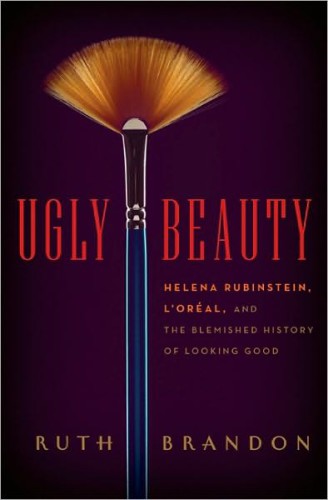
Ugly Beauty
The Ugly Face of the Beauty Business
کتاب های مرتبط
- اطلاعات
- نقد و بررسی
- دیدگاه کاربران
نقد و بررسی

Starred review from November 8, 2010
With wonderful attention to detail and real affection for her subjects, Brandon tells the story of Helena Rubinstein (1870–1965), a Polish Jew from a poor family with a small salon in Australia, who became the first woman tycoon and self-made millionaire. Her timing was excellent: she struck at the moment when decent women, for the first time, were allowing themselves makeup and were willing to shop for it publicly. At the same time, a young French chemist named Eugène Schueller (1881–1957) was making his name in hair dyes (and later collaborating with the Nazis); it was his company, L'Oreal, that swallowed Rubinstein's business. The descriptions of Schueller's political scandals are fascinating, but the story shines when Brandon returns to Rubinstein, a stubborn, spirited woman who responded to a luxury Park Avenue apartment's "No Jews" policy by buying the entire building, and who calmly thwarted robbers in her home at the age of 91. A clearheaded discussion of current beauty standards, vanity, and the gender politics of the modern cosmetic industry rounds out this lively history of the founding of the beauty business as we know it.

November 15, 2010
A sprawling exposé on how the blending of two cosmetics behemoths reopened a shameful era in French history.
After charting the life of self-made beauty entrepreneur Helena Rubinstein (1865–1970), cultural historian and novelist Brandon (Caravaggio's Angel, 2008, etc.) examines the enormous ramifications of hair-dye industrialist Eugène Schueller's collaboration with the Nazi occupation's economy and the insidious reaches of today's beauty industry—e.g., plastic surgery, of which the author herself inquired. The life of Rubinstein is an astounding tale of self-invention and sheer drive. The eldest of eight sisters born to a kerosene dealer in Krakow's Jewish ghetto, Helena, then Chaja, refused to marry the suitor chosen for her and expelled herself from home for good, staying with relatives in Vienna then Australia, where she finally settled on Melbourne as the place from which to launch her own beauty-cream business in 1901. Cooking up her facial creams from her kitchen and marketing them for single working girls in pots labeled "Valaze by Dr. Lykuski," she learned fast the seductive powers of advertising ("rare herbs which only grow in the Carpathian Mountains" was "pure snake oil," the author assures us). By staffing her growing shops over the world with her family members, convincing women of all the different products they needed and employing huge markups, she made herself a wealthy woman in a few short years. Meanwhile, Schueller, a baker's son turned research chemist, invented a safe hair dye that propelled his own business, L'Oréal, which became so popular during the 1920s and '30s that he established his own magazine and theories of management and social responsibility. While not enamored of Hitler, Schueller was pragmatic, and believed that Europe needed a new "economic order." The extent of his financial backing of the French fascist movement La Cagoule would emerge only in 1991, several years after L'Oréal's buyout of Helena Rubinstein Inc.
A wildly convoluted tale as bizarre as it is intriguing.
(COPYRIGHT (2010) KIRKUS REVIEWS/NIELSEN BUSINESS MEDIA, INC. ALL RIGHTS RESERVED.)

January 1, 2011
Beauty became a huge business in the last century, largely through the pioneering efforts of Helena Rubinstein and L'Oreal creator Eugene Schueller. Brandon (Governess: The Lives and Times of the Real Jane Eyres) provides a deep, probing account of how their companies grew to dominate the market and how their merger combined not only products but the founders' opposing philosophies. Rubinstein never quite left behind her humble origins in the Krakow ghetto of late 19th-century Poland during her incredible evolution into the world's first-ever, self-made woman tycoon. Her competitor and ultimate purchaser of her empire Schueller was himself of "humble" origins but through formal science study followed a very different path. Brandon skillfully proceeds from individual histories to explore the improbable phenomenon of bringing together the life's work of these business giants, whose goals, ethics, and backgrounds could hardly have been more incompatible. The final result was an enormously lucrative global enterprise. VERDICT This engaging book should appeal not only to beauty enthusiasts but also to students of corporate histories, who will relish the compelling aspects of the unlikely crossing of paths of two hugely successful entrepreneurs.--Richard Drezen, Brooklyn, NY
Copyright 2011 Library Journal, LLC Used with permission.

January 1, 2011
Expos's of the beauty industry and its relatives, such as cosmetic surgery, are common these days, whether the chosen medium is film or print. In this particular instance, the link between LOr'al (the acquirers of Helena Rubensteins brand) and Fascist collaborators, to mention just one scandal, is old news. Yet for undisclosed reasons, prolific London-based author Brandon (Being Divine, a biography of Sarah Bernhardt, 1991) deliberately selects the known, Helena Rubenstein, and unknown, Eugene Schueller, as appropriate counter-characters to profile. In a way, the two could not be more opposite. Flamboyant Polish Jew Rubenstein promoted everlasting female beauty through the mysterious workings of her creams and cosmetics, whereas chemist Schueller proudly publicized his invention of the first safe artificial hair dye. Brandon details their divergent philosophies (Eugene, for instance, was convinced that every woman belonged at home), their politics, their friendships, family, and passionsand the inextricable business and personal links to Nazi Germany and corporate lack of restitution for WWII wrongs. The story meanders, jumping back and forth chronologically, leaving some difficulty in following.(Reprinted with permission of Booklist, copyright 2011, American Library Association.)

























دیدگاه کاربران